The UCT College of Fellows has named seven new members: academic staff who are recognised for their original and distinguished academic work. The 'newcomers' - acclaimed scholars with vast experience - bring the tally for UCT's fellows to 65. Two of the new fellows hail from the Department of Chemistry.
|
Professor Susan Bourne, Department of Chemistry
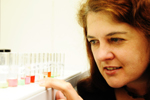 Bourne's research interests lie in structural chemistry, and she's published widely on supramolecular structures (compounds with more than one molecule) and their larger properties. Widely cited, and a leader in crystal engineering, Bourne has made considerable advances in looking at the reactions of one solid to another, reactions that are carried out without solvents and so are of considerable interest to industry, because they are both environmentally friendly and more energy-efficient. Bourne's research interests lie in structural chemistry, and she's published widely on supramolecular structures (compounds with more than one molecule) and their larger properties. Widely cited, and a leader in crystal engineering, Bourne has made considerable advances in looking at the reactions of one solid to another, reactions that are carried out without solvents and so are of considerable interest to industry, because they are both environmentally friendly and more energy-efficient.
|
|
Professor Kelly Chibale, Department of Chemistry
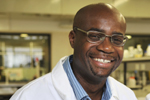 Chibale's first job after university was making commercial explosives for use in mining in Zambia, his country of birth. It was turning to less noisy chemistry that sparked his career, though. A prolific publisher and supervisor and now director of the UCT/Medical Research Council Drug Discovery and Development Research Unit, Chibale's research is aimed at the discovery of potential drugs to fight malaria, tuberculosis, HIV/AIDS, cancer, hypertension and cardiovascular disease. Chibale's first job after university was making commercial explosives for use in mining in Zambia, his country of birth. It was turning to less noisy chemistry that sparked his career, though. A prolific publisher and supervisor and now director of the UCT/Medical Research Council Drug Discovery and Development Research Unit, Chibale's research is aimed at the discovery of potential drugs to fight malaria, tuberculosis, HIV/AIDS, cancer, hypertension and cardiovascular disease.
|
|
Professor Robert Dorrington, School of Actuarial Science
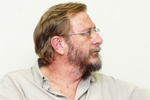 Dorrington has held the UCT chair of actuarial science for over 20 years, so it's no surprise that his résumé makes for lengthy, impressive reading. However, some have singled out the Actuarial Society of South Africa AIDS and Demographic Model as his standout achievement. In the absence of consistent and reliable empirical data, the model has become the 'national reference point' for anyone with an interest or say in tracking and combating the pandemic. Dorrington has held the UCT chair of actuarial science for over 20 years, so it's no surprise that his résumé makes for lengthy, impressive reading. However, some have singled out the Actuarial Society of South Africa AIDS and Demographic Model as his standout achievement. In the absence of consistent and reliable empirical data, the model has become the 'national reference point' for anyone with an interest or say in tracking and combating the pandemic.
|
|
Professor Jill Farrant, Department of Molecular and Cellular Biology
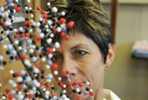 Farrant, UCT's first A-rated woman scientist, is said to be the only researcher in the world running a holistic study of desiccation-tolerant plants, aka resurrection plants, working her way up from the molecular level to plant physiology. Understanding how these unique plants weather droughts could prove useful in the production of drought-tolerant crops. She also works on the other extreme of plant/water relations, conducting research on desiccation sensitivity in recalcitrant seeds. These seeds germinate immediately on shedding, and die if they go without water, and so cannot be stored for germplasm (the hereditary genetic material) conservation. Farrant, UCT's first A-rated woman scientist, is said to be the only researcher in the world running a holistic study of desiccation-tolerant plants, aka resurrection plants, working her way up from the molecular level to plant physiology. Understanding how these unique plants weather droughts could prove useful in the production of drought-tolerant crops. She also works on the other extreme of plant/water relations, conducting research on desiccation sensitivity in recalcitrant seeds. These seeds germinate immediately on shedding, and die if they go without water, and so cannot be stored for germplasm (the hereditary genetic material) conservation.
|
|
Professor Estelle Lambert, Department of Human Biology
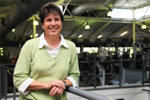 Known as Vicki around UCT offices, Lambert's work spills over from the lab into wider society. She's inspired a cadre of young, mostly female scientists, played a major role in the development of teaching and research programmes in biokinetics, is doing groundbreaking work with a leading medical insurance company to track the health behaviours and outcomes of 1.5 million South Africans, promotes physical activity as part of an international network, and boasts a panoramic oeuvre of scientific research. Known as Vicki around UCT offices, Lambert's work spills over from the lab into wider society. She's inspired a cadre of young, mostly female scientists, played a major role in the development of teaching and research programmes in biokinetics, is doing groundbreaking work with a leading medical insurance company to track the health behaviours and outcomes of 1.5 million South Africans, promotes physical activity as part of an international network, and boasts a panoramic oeuvre of scientific research.
|
|
Professor Anna-Lise Williamson, Division of Medical Virology
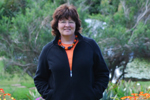 Williamson's initial work was on a novel retrovirus in sheep, but it is her ongoing research on the human papillomavirus - a leading cause of cervical cancer - and the human immunodeficiency virus that has defined her career thus far. As head of the HIV Vaccine Development Group at UCT, Williamson nursed the first African-developed candidate vaccines - both targeting HIV subtype C, the most common strain in Africa - to human trials in 2009. Williamson's initial work was on a novel retrovirus in sheep, but it is her ongoing research on the human papillomavirus - a leading cause of cervical cancer - and the human immunodeficiency virus that has defined her career thus far. As head of the HIV Vaccine Development Group at UCT, Williamson nursed the first African-developed candidate vaccines - both targeting HIV subtype C, the most common strain in Africa - to human trials in 2009.
|
|
Professor Robin Wood, Department of Medicine
 The 2008 Special Medicine Service Award from the South African Medical Association was but the latest tribute to Wood's contribution to HIV/AIDS research in South Africa. Tracking the spread and impact of HIV for over 15 years, Wood's particular interest has been the fatal, all-too-common combination of HIV and tuberculosis in South Africa. Out of the lab, he has spearheaded studies on the promising impact that antiretroviral therapy has had on HIV/TB co-occurrence. The 2008 Special Medicine Service Award from the South African Medical Association was but the latest tribute to Wood's contribution to HIV/AIDS research in South Africa. Tracking the spread and impact of HIV for over 15 years, Wood's particular interest has been the fatal, all-too-common combination of HIV and tuberculosis in South Africa. Out of the lab, he has spearheaded studies on the promising impact that antiretroviral therapy has had on HIV/TB co-occurrence.
|
 This work is licensed under a Creative Commons Attribution-NoDerivatives 4.0 International License.
This work is licensed under a Creative Commons Attribution-NoDerivatives 4.0 International License.

 Bourne's research interests lie in structural chemistry, and she's published widely on supramolecular structures (compounds with more than one molecule) and their larger properties. Widely cited, and a leader in crystal engineering, Bourne has made considerable advances in looking at the reactions of one solid to another, reactions that are carried out without solvents and so are of considerable interest to industry, because they are both environmentally friendly and more energy-efficient.
Bourne's research interests lie in structural chemistry, and she's published widely on supramolecular structures (compounds with more than one molecule) and their larger properties. Widely cited, and a leader in crystal engineering, Bourne has made considerable advances in looking at the reactions of one solid to another, reactions that are carried out without solvents and so are of considerable interest to industry, because they are both environmentally friendly and more energy-efficient. Chibale's first job after university was making commercial explosives for use in mining in Zambia, his country of birth. It was turning to less noisy chemistry that sparked his career, though. A prolific publisher and supervisor and now director of the UCT/Medical Research Council Drug Discovery and Development Research Unit, Chibale's research is aimed at the discovery of potential drugs to fight malaria, tuberculosis, HIV/AIDS, cancer, hypertension and cardiovascular disease.
Chibale's first job after university was making commercial explosives for use in mining in Zambia, his country of birth. It was turning to less noisy chemistry that sparked his career, though. A prolific publisher and supervisor and now director of the UCT/Medical Research Council Drug Discovery and Development Research Unit, Chibale's research is aimed at the discovery of potential drugs to fight malaria, tuberculosis, HIV/AIDS, cancer, hypertension and cardiovascular disease. Dorrington has held the UCT chair of actuarial science for over 20 years, so it's no surprise that his résumé makes for lengthy, impressive reading. However, some have singled out the Actuarial Society of South Africa AIDS and Demographic Model as his standout achievement. In the absence of consistent and reliable empirical data, the model has become the 'national reference point' for anyone with an interest or say in tracking and combating the pandemic.
Dorrington has held the UCT chair of actuarial science for over 20 years, so it's no surprise that his résumé makes for lengthy, impressive reading. However, some have singled out the Actuarial Society of South Africa AIDS and Demographic Model as his standout achievement. In the absence of consistent and reliable empirical data, the model has become the 'national reference point' for anyone with an interest or say in tracking and combating the pandemic. Farrant, UCT's first A-rated woman scientist, is said to be the only researcher in the world running a holistic study of desiccation-tolerant plants, aka resurrection plants, working her way up from the molecular level to plant physiology. Understanding how these unique plants weather droughts could prove useful in the production of drought-tolerant crops. She also works on the other extreme of plant/water relations, conducting research on desiccation sensitivity in recalcitrant seeds. These seeds germinate immediately on shedding, and die if they go without water, and so cannot be stored for germplasm (the hereditary genetic material) conservation.
Farrant, UCT's first A-rated woman scientist, is said to be the only researcher in the world running a holistic study of desiccation-tolerant plants, aka resurrection plants, working her way up from the molecular level to plant physiology. Understanding how these unique plants weather droughts could prove useful in the production of drought-tolerant crops. She also works on the other extreme of plant/water relations, conducting research on desiccation sensitivity in recalcitrant seeds. These seeds germinate immediately on shedding, and die if they go without water, and so cannot be stored for germplasm (the hereditary genetic material) conservation. Known as Vicki around UCT offices, Lambert's work spills over from the lab into wider society. She's inspired a cadre of young, mostly female scientists, played a major role in the development of teaching and research programmes in biokinetics, is doing groundbreaking work with a leading medical insurance company to track the health behaviours and outcomes of 1.5 million South Africans, promotes physical activity as part of an international network, and boasts a panoramic oeuvre of scientific research.
Known as Vicki around UCT offices, Lambert's work spills over from the lab into wider society. She's inspired a cadre of young, mostly female scientists, played a major role in the development of teaching and research programmes in biokinetics, is doing groundbreaking work with a leading medical insurance company to track the health behaviours and outcomes of 1.5 million South Africans, promotes physical activity as part of an international network, and boasts a panoramic oeuvre of scientific research. Williamson's initial work was on a novel retrovirus in sheep, but it is her ongoing research on the human papillomavirus - a leading cause of cervical cancer - and the human immunodeficiency virus that has defined her career thus far. As head of the HIV Vaccine Development Group at UCT, Williamson nursed the first African-developed candidate vaccines - both targeting HIV subtype C, the most common strain in Africa - to human trials in 2009.
Williamson's initial work was on a novel retrovirus in sheep, but it is her ongoing research on the human papillomavirus - a leading cause of cervical cancer - and the human immunodeficiency virus that has defined her career thus far. As head of the HIV Vaccine Development Group at UCT, Williamson nursed the first African-developed candidate vaccines - both targeting HIV subtype C, the most common strain in Africa - to human trials in 2009. The 2008 Special Medicine Service Award from the South African Medical Association was but the latest tribute to Wood's contribution to HIV/AIDS research in South Africa. Tracking the spread and impact of HIV for over 15 years, Wood's particular interest has been the fatal, all-too-common combination of HIV and tuberculosis in South Africa. Out of the lab, he has spearheaded studies on the promising impact that antiretroviral therapy has had on HIV/TB co-occurrence.
The 2008 Special Medicine Service Award from the South African Medical Association was but the latest tribute to Wood's contribution to HIV/AIDS research in South Africa. Tracking the spread and impact of HIV for over 15 years, Wood's particular interest has been the fatal, all-too-common combination of HIV and tuberculosis in South Africa. Out of the lab, he has spearheaded studies on the promising impact that antiretroviral therapy has had on HIV/TB co-occurrence.







